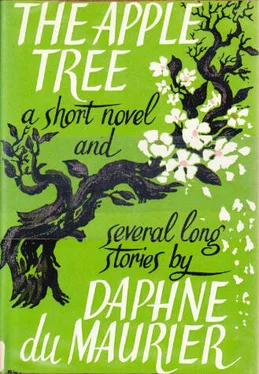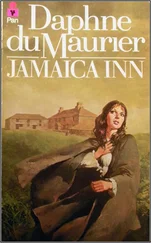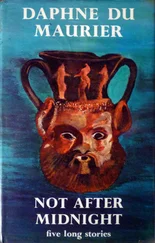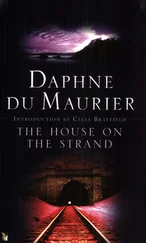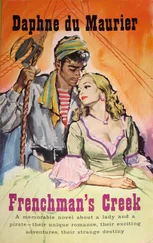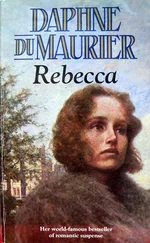Daphne du Maurier - The Apple Tree - a short novel & several long stories
Здесь есть возможность читать онлайн «Daphne du Maurier - The Apple Tree - a short novel & several long stories» весь текст электронной книги совершенно бесплатно (целиком полную версию без сокращений). В некоторых случаях можно слушать аудио, скачать через торрент в формате fb2 и присутствует краткое содержание. Жанр: Современная проза, Триллер, Социально-психологическая фантастика, на английском языке. Описание произведения, (предисловие) а так же отзывы посетителей доступны на портале библиотеки ЛибКат.
- Название:The Apple Tree: a short novel & several long stories
- Автор:
- Жанр:
- Год:неизвестен
- ISBN:нет данных
- Рейтинг книги:5 / 5. Голосов: 1
-
Избранное:Добавить в избранное
- Отзывы:
-
Ваша оценка:
- 100
- 1
- 2
- 3
- 4
- 5
The Apple Tree: a short novel & several long stories: краткое содержание, описание и аннотация
Предлагаем к чтению аннотацию, описание, краткое содержание или предисловие (зависит от того, что написал сам автор книги «The Apple Tree: a short novel & several long stories»). Если вы не нашли необходимую информацию о книге — напишите в комментариях, мы постараемся отыскать её.
The Apple Tree: a short novel & several long stories — читать онлайн бесплатно полную книгу (весь текст) целиком
Ниже представлен текст книги, разбитый по страницам. Система сохранения места последней прочитанной страницы, позволяет с удобством читать онлайн бесплатно книгу «The Apple Tree: a short novel & several long stories», без необходимости каждый раз заново искать на чём Вы остановились. Поставьте закладку, и сможете в любой момент перейти на страницу, на которой закончили чтение.
Интервал:
Закладка:
"Thank you," she said. "I shall call in at the shop to see the proofs in a few days' time. Good-morning."
He bowed, he went away, an employee who had fulfilled his orders.
"I hope he has taken some good photographs," said Miss Clay. "The Marquis will be very pleased to see the results."
The Marquise did not answer. She was taking off the gold clips from her ears that now, for some reason, no longer matched her mood. She would go down to déjeuner without jewellery, without rings; she felt, for today, her own beauty would suffice.
Three days passed, and the Marquise did not once descend into the little town. The first day she swam, she watched the tennis in the afternoon. The second day she spent with the children, giving Miss Clay leave of absence to take a tour by charabanc to visit the old walled cities, further inland, along the coast. The third day, she sent Miss Clay and the children into the town to enquire for the proofs, and they returned with them wrapped in a neat package. The Marquise examined them. They were very good indeed, and the studies of herself the best she had ever had taken.
Miss Clay was in raptures. She begged for copies to send home to England. "Who would believe it," she exclaimed, "that a little photographer, by the sea like this, could take such splendid pictures? And then you go and pay heaven knows what to real professionals in Paris."
"They are not bad," said the Marquise, yawning. "He certainly took a lot of trouble. They are better of me than they are of the children." She folded the package and put it away in a drawer. "Did Monsieur Paul seem pleased with them himself?" she asked the governess.
"He did not say," replied Miss Clay. "He seemed disappointed that you had not gone down for them yourself; he said they had been ready since yesterday. He asked if you were well, and the children told him maman had been swimming. They were quite friendly with him."
"It's much too hot and dusty, down in the town," said the Marquise.
The next afternoon, when Miss Clay and the children were resting and the hotel itself seemed asleep under the glare of the sun, the Marquise changed into a short sleeveless frock, very simple and plain, and softly, so as not to disturb the children, went downstairs, her small box camera slung over her arm, and walking through the hotel grounds on to the sands she followed a narrow path that led upwards, to the greensward above. The sun was merciless. Yet she did not mind. Here on the springing grass there was no dust, and presently, by the cliff's edge, the bracken, growing thicker, brushed her bare legs.
The little path wound in and out amongst the bracken, at times coming so close to the cliff's edge that a false step, bringing a stumble, would spell danger. But the Marquise, walking slowly, with the lazy swing of the hips peculiar to her, felt neither frightened nor exhausted. She was merely intent on reaching a spot that overlooked the great rock, standing out from the coast in the middle of the bay. She was quite alone on the headland. No one was in sight. Away behind her, far below, the white walls of the hotel, and the rows of bathing cabins on the beach, looked like bricks, played with by children. The sea was very smooth and still. Even where it washed upon the rock in the bay it left no ripple.
Suddenly the Marquise saw something flash in the bracken ahead of her. It was the lens of a camera. She took no notice. Turning her back, she pretended to examine her own camera, and took up a position as though to photograph the view. She took one, took another, and then she heard the swish of someone walking towards her through the bracken.
She turned, surprised. "Why, good afternoon, Monsieur Paul," she said.
He had discarded the cheap stiff jacket and the bright blue shirt. He was not on business. It was the hour of the siesta, when he walked, as it were, incognito. He wore only the vest and a pair of dark blue trousers, and the grey squash hat, which she had noticed with dismay the morning he had come to the hotel, was also absent. His thick dark hair made a frame to his gentle face. His eyes had such a rapturous expression at the sight of her that she was forced to turn away to hide her smile.
"You see," she said lightly, "I have taken your advice, and strolled up here to look at the view. But I am sure I don't hold my camera correctly. Show me how."
He stood beside her and, taking her camera, steadied her hands, moving them to the correct position.
"Yes, of course," she said, and then moved away from him, laughing a little, for it had seemed to her that when he stood beside her and guided her hands she had heard his heart beating, and the sound brought excitement, which she wished to conceal from him.
"Have you your own camera?" she said.
"Yes, Madame la Marquise," he answered, "I left it over in the bracken there, with my coat. It is a favourite spot of mine, close to the edge of the cliff. In spring I come here to watch the birds and take photographs of them."
"Show me," she said.
He led the way, murmuring "Pardon," and the path he had made for himself took them to a little clearing, like a nest, hidden on all sides by bracken that was now waist-high. Only the front of the clearing was open, and this was wide to the cliff face, and the sea.
"But how lovely," she said, and passing through the bracken into the hiding-place she looked about her, smiling, and sitting down, gracefully, naturally, like a child at a picnic, she picked up the book that was lying on top of his coat beside his camera.
"You read much?" she said.
"Yes, Madame la Marquise," he answered. "I am very fond of reading." She glanced at the cover, and read the title. It was a cheap romance, the sort of book she and her friends had smuggled into their satchels at the lycée, in old days. She had not read that sort of stuff for years. Once again she had to hide her smile. She put the book back on the coat.
"Is it a good story?" she asked him.
He looked down at her solemnly, with his great eyes like a gazelle's.
"It is very tender, Madame la Marquise," he said.
Tender… What an odd expression. She began to talk about the proofs of the photographs, and how she preferred one to another, and all the while she was conscious of an inner triumph that she was in such command of the situation. She knew exactly what to do, what to say, when to smile, when to look serious. It reminded her strangely of childhood days, when she and her young friends would dress up in their mothers' hats and say, "Let's pretend to be ladies." She was pretending now; not to be a lady, as then, but to be — what? She was not sure. But something other than the self who now, for so long, was in truth a real lady; sipping tea in the salon at the chateau, surrounded by so many ancient things and people that each one of them had the mustiness of death.
The photographer did not talk much. He listened to the Marquise. He agreed, nodded his head, or simply remained silent, and she heard her own voice trilling on in a sort of wonder. He was merely a witness she could ignore, a lay-figure, while she listened to the brilliant, charming woman that had suddenly become herself.
At last there came a pause in the one-sided conversation, and he said to her, shyly, "May I dare to ask you something?"
"Of course," she said.
"Could I photograph you here, alone, with this background?"
Was that all? How timid he was, and how reluctant. She laughed.
"Take as many as you want," she said, "it is very pleasant sitting here. I may even go to sleep."
"La belle au bois dormant," he said quickly, and then, as if ashamed of his familiarity, he murmured, "Pardon" once more and reached for the camera behind her.
This time he did not ask her to pose, to change position. He photographed her as she sat, lazily nibbling at a stem of grass, and it was he who moved, now here, now there, so that he had shots of her from every angle, full-face, profile, three-quarter.
Читать дальшеИнтервал:
Закладка:
Похожие книги на «The Apple Tree: a short novel & several long stories»
Представляем Вашему вниманию похожие книги на «The Apple Tree: a short novel & several long stories» списком для выбора. Мы отобрали схожую по названию и смыслу литературу в надежде предоставить читателям больше вариантов отыскать новые, интересные, ещё непрочитанные произведения.
Обсуждение, отзывы о книге «The Apple Tree: a short novel & several long stories» и просто собственные мнения читателей. Оставьте ваши комментарии, напишите, что Вы думаете о произведении, его смысле или главных героях. Укажите что конкретно понравилось, а что нет, и почему Вы так считаете.
